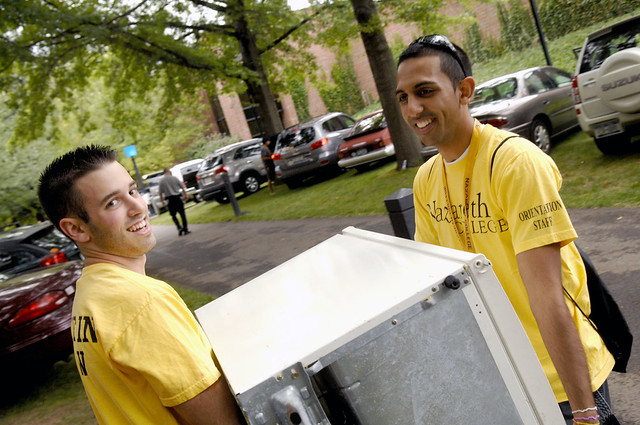Moving out of your dorm at the end of the semester is a bittersweet experience. While leaving behind college friends for the summer can be sad, summer plans and goals frequently trump all apprehensions about leaving campus. With the stress of finals and the desire to embark on your vacation, sometimes packing up your room becomes a mindless test of speed and efficiency, making it easy to overlook minor faults and damages to your room. Usually, the worst outcome is a suitcase full of dirty laundry and a possibly broken desk lamp, but it isn’t uncommon to run into more severe consequences: room damage fees. Below is a list of ways to help avoid being confronted with dorm damage and moving fees.
- Don’t overlook the condition card!
At the start of the semester, during move-in, your college residence advisor most likely handed you a condition card where you could indicate current damages and issues with your room assignment. These cards are of the utmost importance as they serve to gauge the severity of changes to the condition of your room when it is reviewed after you move out. It is important to be as specific as possible on these cards and to include even the most minor issues with your room to make sure that you are protected against future potential for charges. If your school doesn’t provide condition cards, speak with your residence advisor regarding the condition of your room to make sure that its shape is taken note of before the start of your semester.
2. Maintenance is your friend!
If something goes awry in your room, be sure to call maintenance in a timely fashion to report the incident. Accidents happen, and if you are proactive about fixing an issue, you are far less likely to incur dorm damage charges. If you did not alert maintenance to the issue and left it to be discovered after you had moved out, it can get pricey. Similarly, if you notice a problem in a common area of your dormitory, don’t hesitate to call it in! Reporting problems without hesitation can save both you and your neighbors from fines; some schools even have anonymous tip lines, which you can call or text regarding condition issues in campus buildings.
3. Move out should mirror move in!
Possibly the most critical piece of advice is to ensure that you leave your dorm at the end of the semester looking precisely as it did when you first arrived last fall. Schools are very strict about the furnishings they include in the room, so be sure not only to double-check that everything which came with your room is there, but I would also recommend leaving the furniture arranged in the way in which you found it. This allows for a more straightforward examination of your room after you go and helps to prevent additional fees. Also, make sure to donate and/or dispose of any items you do not wish to take back with you. It would be frustrating to receive a fine due to forgetting to empty your trash or similarly neglecting to drop off winter clothes at your local charity.
Before moving out, be sure to clarify your dorm’s specific rules and regulations regarding move-out procedures and common room conditions with your residence advisor. This can save you from possible fines and make the move-out process run smoothly for you. Suppose you’re worried about having to pay for damages at the end of the semester. In that case, you may want to consider a renters insurance policy, which may cover the expenses incurred if there are damages.




